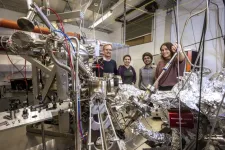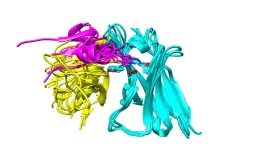(Press-News.org) UNIVERSITY PARK, Pa. — Broccoli is known to be beneficial to our health. For example, research has shown that increased consumption of the cruciferous vegetable decreases incidences of cancer and type 2 diabetes. In a recent study, researchers at Penn State found that broccoli contains certain molecules that bind to a receptor within mice and help to protect the lining of the small intestine, thereby inhibiting the development of disease. The findings lend support to the idea that broccoli truly is a ‘superfood.’
“We all know that broccoli is good for us, but why? What happens in the body when we eat broccoli?” said Gary Perdew, H. Thomas and Dorothy Willits Hallowell Chair in Agricultural Sciences, Penn State. “Our research is helping to uncover the mechanisms for how broccoli and other foods benefit health in mice and likely humans, as well. It provides strong evidence that cruciferous vegetables, such as broccoli, cabbage, and Brussels sprouts should be part of a normal healthy diet.”
According to Perdew, the wall of the small intestine allows beneficial water and nutrients to pass into the body but prevents food particles and bacteria that could cause harm. Certain cells that line the intestine — including enterocytes, which absorb water and nutrients; goblet cells, which secrete a protective layer of mucus on the intestinal wall; and Paneth cells, which secrete lysosomes that contain digestive enzymes — help to modulate this activity and keep a healthy balance.
In their study, which published in the journal Laboratory Investigation, Perdew and his colleagues found that molecules in broccoli, called aryl hydrocarbon receptor ligands, bind to aryl hydrocarbon receptor (AHR), which is a type of protein called a transcription factor. This binding, they found, initiates a variety of activities that affect the functions of intestinal cells.
To conduct their study, the researchers fed an experimental group of mice a diet containing 15% broccoli — equivalent to about 3.5 cups per day for humans — and fed a control group of mice a typical lab diet that did not contain broccoli. They then analyzed the animals’ tissues to determine the extent to which AHR was activated, as well as the quantities of various cell types and mucus concentrations, among other factors, in the two groups.
The team found that mice that were not fed broccoli lacked AHR activity, which resulted in altered intestinal barrier function, reduced transit time of food in the small intestine, decreased number of goblet cells and protective mucus, decreased Paneth cells and lysosome production, and decreased number of enterocyte cells.
“The gut health of the mice that were not fed broccoli was compromised in a variety of ways that are known to be associated with disease,” said Perdew. “Our research suggests that broccoli and likely other foods can be used as natural sources of AHR ligands, and that diets rich in these ligands contribute to resilience of the small intestine.”
More broadly, added Andrew Patterson, John T. and Paige S. Smith Professor of Molecular Toxicology and of Biochemistry and Molecular Biology, “these data suggest that dietary cues, relayed through the activity of AHR, can reshape the cellular and metabolic repertoire of the gastrointestinal tract.”
Other authors on the paper include Xiaoliang Zhou, Debopriya Chakraborty, Iain A. Murray, Denise Coslo, Zoe Kehs, Anitha Vijay, Carolyn Ton, Dhimant Desai and Shantu G. Amin.
The National Institutes of Health Grants, U.S. Department of Agriculture and Penn State Cancer Institute supported this research.
END
Broccoli consumption protects gut lining, reduces disease, in mice
Researchers discover that a certain molecule in broccoli interacts with a receptor in mice to promote gut health
2023-04-06
ELSE PRESS RELEASES FROM THIS DATE:
UNLV, SNWA study makes case for Candida auris wastewater surveillance
2023-04-06
A rapid spike in cases of a potentially deadly, drug-resistant fungus has concerned public health officials across the nation. But a team of Southern Nevada researchers hope their new study applying wastewater surveillance can help health officials get a step ahead of this emerging global public health threat.
The Pathogen Problem
Candida auris is a fungus that can cause serious infections, particularly in patients who are immunocompromised, have pre-existing health conditions, are in long-term healthcare settings, or are undergoing treatment with invasive medical devices such as a catheter. Infection prevention ...
Giving pregnant women routine third trimester ultrasound scans could reduce rates of undetected breech pregnancy by 71%, enabling better care before and during labor and improved outcomes for newborns
2023-04-06
Giving pregnant women routine third trimester ultrasound scans could reduce rates of undetected breech pregnancy by 71%, enabling better care before and during labor and improved outcomes for newborns
In your coverage, please use this URL to provide access to the freely available paper in PLOS Medicine: http://journals.plos.org/plosmedicine/article?id=10.1371/journal.pmed.1004192
Article Title: Impact of point-of-care ultrasound and routine third trimester ultrasound on undiagnosed breech presentation and perinatal outcomes: An observational multicentre cohort study
Author Countries: United Kingdom, Turkey
Funding: The author(s) received no specific funding for this work. END ...
Implant treats dangerously low blood pressure in people with spinal cord injury
2023-04-06
An implant that delivers electrical stimulation to a select group of spinal neurons can treat dangerously low blood pressure in people with spinal cord injuries, addressing an often “invisible” consequence of paralysis.
For his work in developing this treatment, called the neuroprosthetic baroreflex, Jordan W. Squair is the winner of the 2023 BioInnovation Institute & Science Prize for Innovation. The prize seeks to reward scientists who deliver research at the intersection of the life sciences and entrepreneurship.
“Dr. Squair’s prize-winning research on epidural electrical stimulation restores blood pressure control in patients ...
Editorial: Share SARS-CoV-2 data immediately
2023-04-06
In an editorial, Maria Van Kerkhove – who serves as the technical lead for the COVID-19 response at the World Health Organization (WHO) – outlines how earlier this month (March 2023), WHO learned that scientists in China possessed data on viral samples from Wuhan that had been gathered in January 2020. “These should have been shared immediately—not 3 years later,” she writes. “The lack of data disclosure is simply inexcusable.” WHO continues to call on China and all countries to share any data on the origins of SARS-CoV-2 immediately. “China has advanced technical capabilities,” Van ...
Uncovered: A new mode of reproduction that produces chimeric males in yellow crazy ants
2023-04-06
Male yellow crazy ants (Anoplolepis gracilipes) are chimeras of two separate genetic lineages, researchers report in a study that reveals a unique mode of reproduction in this species – one previously unknown to science. While most multicellular organisms develop from a single-cell zygote into a collection of genetically identical cells – a hallmark of biological inheritance – the new findings show that yellow crazy ants deviate from this expectation. According to the study, all male yellow crazy ants are instead composed ...
Bushmeat consumption unchanged by COVID-19 in Kenya and Tanzania border towns, new study reveals
2023-04-06
First ever study looking at disease risks of wild meat activities in rural communities.
Nearly 70% of rural respondents at Kenya-Tanzania border said that COVID-19 did not impact their levels of wild meat consumption, with some even reporting increased consumption.
Ungulates were found to be the most consumed species, followed by birds, rodents and shrews.
Governments need to focus on better controlling zoonotic disease transmission risks through community engagements on behavior change interventions, improving hygiene and standards of informal markets, supporting wildlife conservation ...
Methyl groups enhance key properties of PHA plastics and enable closed-loop recyclability
2023-04-06
A class of polyesters considered a promising alternative to common plastics, were it not for limitations like brittleness and thermal instability, have now been made more mechanically tough and thermally stable. Researchers replaced the reactive hydrogens in the monomer of these materials – polyhydroxyalkanoate (PHA) plastics – and found it enhanced PHA thermal and mechanical properties and enabled closed-loop chemical recyclability. The new approach could provide a route for increased use of sustainable PHA plastics. ...
Ultra-fast light at the end of the vacuum tunnel: Meta-optics shows physical processes in the attosecond range
2023-04-06
Developed at Harvard, and successfully tested at Graz University of Technology (TU Graz), a revolutionary new meta-optics for microscopes with extremely high spatial and temporal resolution has proven its functional ability in laboratory tests at the Institute of Experimental Physics at TU Graz. Microscopes using this kind of lens promise completely new research and development approaches, especially in semiconductor and solar cell technology. The research team from Graz and Boston currently reports on the construction and the successful laboratory experiment with this new meta-optics in the specialist journal Science.
The lens of ...
New atomic-scale understanding of catalysis could unlock massive energy savings
2023-04-06
MADISON – In an advance they consider a breakthrough in computational chemistry research, University of Wisconsin–Madison chemical engineers have developed model of how catalytic reactions work at the atomic scale. This understanding could allow engineers and chemists to develop more efficient catalysts and tune industrial processes — potentially with enormous energy savings, given that 90% of the products we encounter in our lives are produced, at least partially, via catalysis.
Catalyst materials accelerate chemical reactions without undergoing changes themselves. ...
Researchers reveal why viruses like SARS-CoV-2 can reinfect hosts, evade the immune response
2023-04-06
The human body is capable of creating a vast, diverse repertoire of antibodies—the Y-shaped sniffer dogs of the immune system that can find and flag foreign invaders. Despite our ability to create a range of antibodies to target viruses, humans create antibodies that target the same viral regions again and again, according to a new study led by investigators from Brigham and Women’s Hospital, a founding member of the Mass General Brigham healthcare system, and Harvard Medical School. These “public epitopes” mean that the generation ...
LAST 30 PRESS RELEASES:
Brain cells drive endurance gains after exercise
Same-day hospital discharge is safe in selected patients after TAVI
Why do people living at high altitudes have better glucose control? The answer was in plain sight
Red blood cells soak up sugar at high altitude, protecting against diabetes
A new electrolyte points to stronger, safer batteries
Environment: Atmospheric pollution directly linked to rocket re-entry
Targeted radiation therapy improves quality of life outcomes for patients with multiple brain metastases
Cardiovascular events in women with prior cervical high-grade squamous intraepithelial lesion
Transplantation and employment earnings in kidney transplant recipients
Brain organoids can be trained to solve a goal-directed task
Treatment can protect extremely premature babies from lung disease
Roberto Morandotti wins prestigious Max Born Award for pioneering research in quantum photonics
Scientists map brain's blood pressure control center
Acute coronary events registry provides insights into sex-specific differences
Bar-Ilan University and NVIDIA researchers improve AI’s ability to understand spatial instructions
New single-cell transcriptomic clock reveals intrinsic and systemic T cell aging in COVID-19 and HIV
Smaller fish and changing food webs – even where species numbers stay the same
Missed opportunity to protect pregnant women and newborns: Study shows low vaccination rates among expectant mothers in Norway against COVID-19 and influenza
Emotional memory region of aged brain is sensitive to processed foods
Neighborhood factors may lead to increased COPD-related emergency department visits, hospitalizations
Food insecurity impacts employees’ productivity
Prenatal infection increases risk of heavy drinking later in life
‘The munchies’ are real and could benefit those with no appetite
FAU researchers discover novel bacteria in Florida’s stranded pygmy sperm whales
DEGU debuts with better AI predictions and explanations
‘Giant superatoms’ unlock a new toolbox for quantum computers
Jeonbuk National University researchers explore metal oxide electrodes as a new frontier in electrochemical microplastic detection
Cannabis: What is the profile of adults at low risk of dependence?
Medical and materials innovations of two women engineers recognized by Sony and Nature
Blood test “clocks” predict when Alzheimer’s symptoms will start
[Press-News.org] Broccoli consumption protects gut lining, reduces disease, in miceResearchers discover that a certain molecule in broccoli interacts with a receptor in mice to promote gut health




